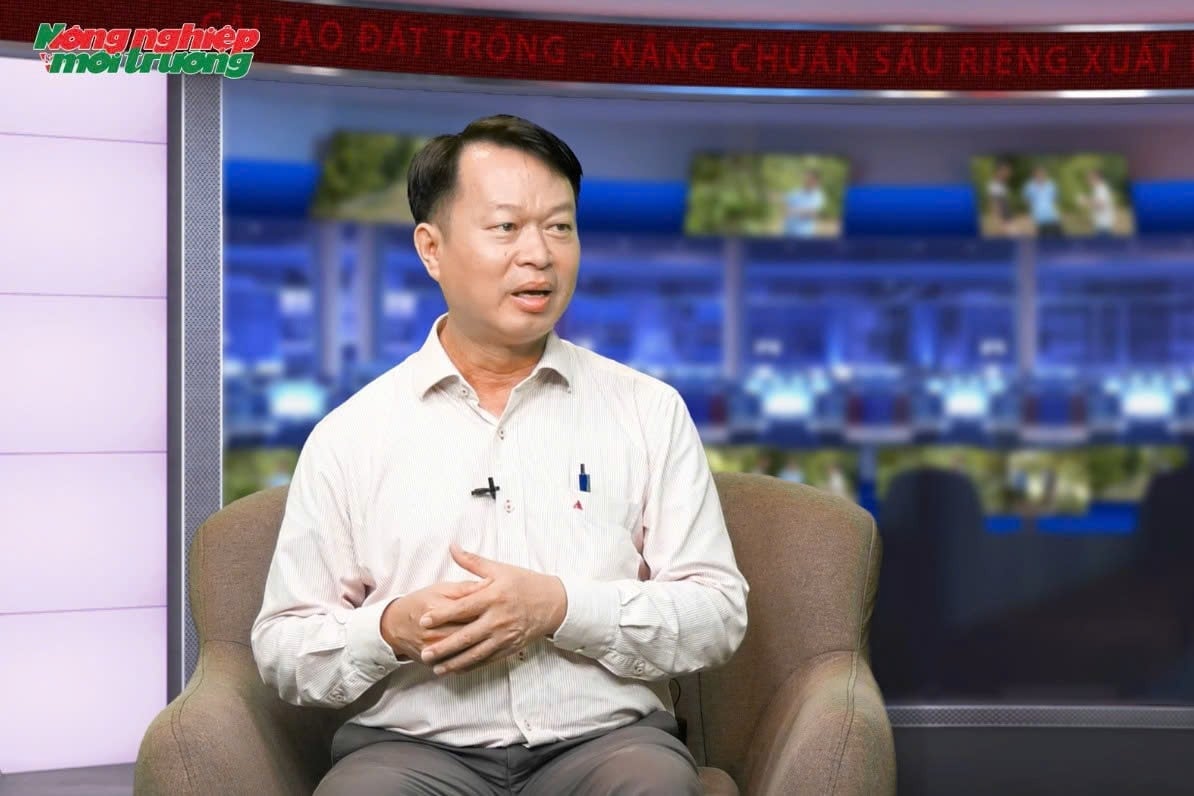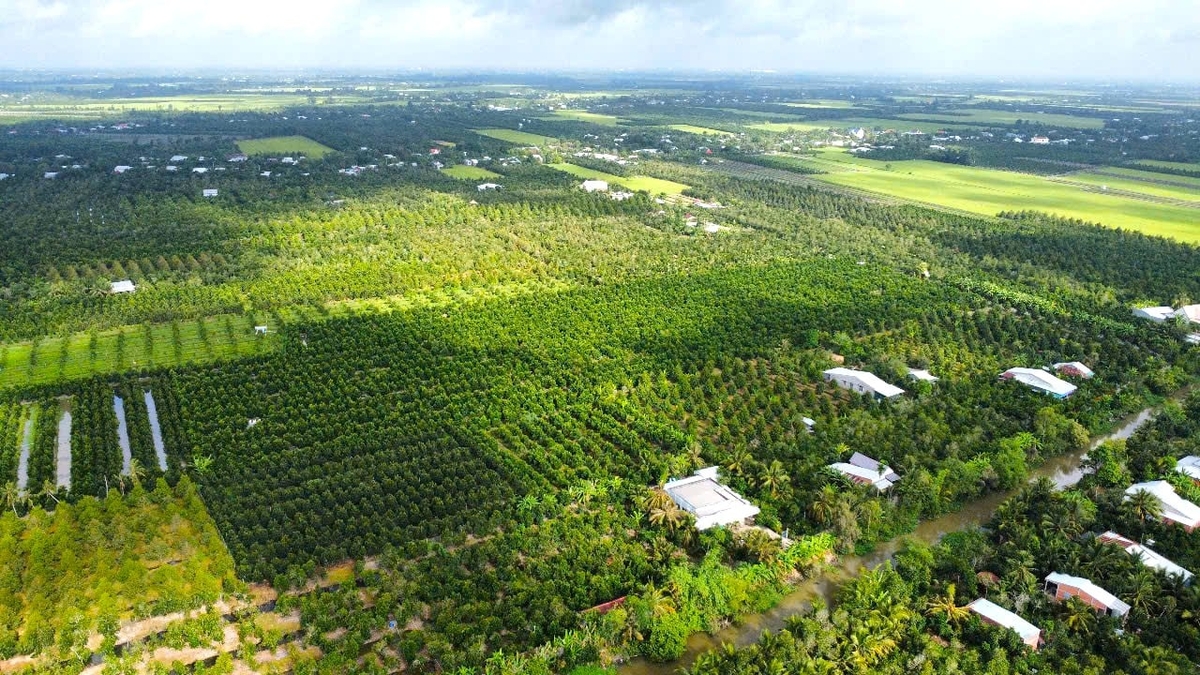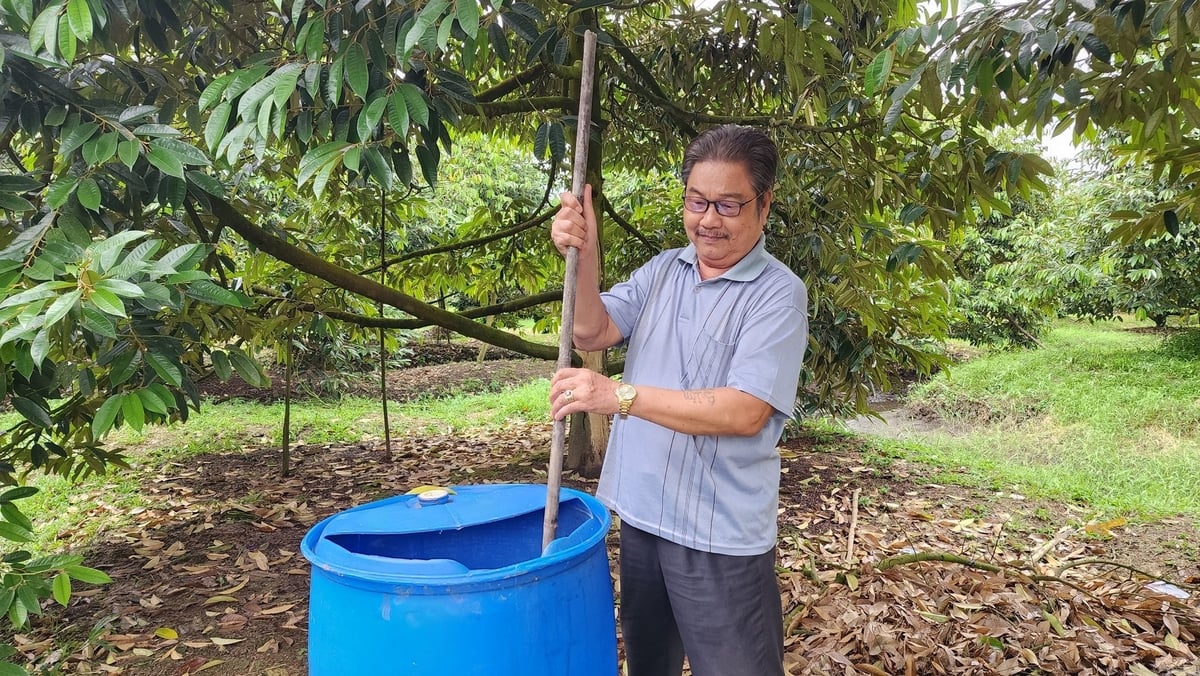December 8, 2025 | 09:30 GMT +7
December 8, 2025 | 09:30 GMT +7
Hotline: 0913.378.918
December 8, 2025 | 09:30 GMT +7
Hotline: 0913.378.918
Considered a high-value crop, durian has emerged as an important product in the agricultural reorganization of numerous provinces in the Mekong Delta. Associate Professor Dr. Nguyen Khoi Nghia, Deputy Head of the Department of Soil Science at Can Tho University’s School of Agriculture, warns that this surge masks an escalating crisis in farmland sustainability.

Associate Professor, Dr. Nguyen Khoi Nghia, Deputy Head of Soil Science Department (School of Agriculture, Can Tho University). Photo: Kim Anh.
Dr. Nghia reports that durian plantations across the country have exceeded 150,000 hectares, doubling the government's forecast for 2030. The agricultural land in the Mekong Delta has expanded to over 40,000 hectares, extending beyond traditional regions such as Dong Thap, Vinh Long, and Can Tho City to include provinces like Tay Ninh and An Giang.
Dr. Nghia expresses deep concern that most of this new land expansion is happening without proper planning and lacks a foundation for sustainable farming practices. Field surveys indicate that numerous farmers have not assessed the suitability of their soil for durian growth, nor do they understand its special requirements. Soil tests performed in multiple parts of the Mekong Delta, particularly on durian plots above 15 years of age, reveal concerning indicators.
The results showed noticeable soil degradation: pH levels between 4 and 5, organic matter content declined to 2–4%, and substantial shortages in nitrogen (N), potassium (K), and micronutrients such as boron (B), molybdenum (Mo), and copper (Cu). Moreover, microbial populations and enzyme activities in the soil are significantly reduced reflecting an extensive biological imbalance.

Durian growing area in the Mekong Delta is growing quite rapidly. Photo: Kim Anh.
The accumulation of toxic substances in the soil is particularly concerning. This is primarily attributed to the overuse of chemical pesticides and flower-inducing agents such as potassium chlorate and paclobutrazol, as well as heavy metals such as arsenic (As), cadmium (Cd), and lead (Pb).
These residues adversely impact plant health, reducing durian profitability and fruit quality. They also present health hazards to humans and threaten the fruit's adherence to export regulations.
Dr. Nghia acknowledges, “Soil degradation is a natural process over time, but what is truly alarming is the accelerated decline caused by human practices at a dangerous rate.”
He observes that although farmers possess considerable expertise in applying chemicals, including fertilizers, growth stimulants, and pesticides, they neglect soil health and the preservation of its ecological balance. The fundamental question, “How can we keep soil healthy?” often goes unresolved.

“If we do not change our thinking and habits, the land will become increasingly depleted and Vietnamese agricultural products will not be eligible for export”, Associate Professor Dr. Nguyen Khoi Nghia warned. Photo: Kim Anh.
Therefore, when developed durian trees start declining or suffer from root illnesses, freshly planted trees in the same soil face difficulties in surviving. They exhibit poor growth, yellowing leaves, or fail to form roots, indicating that the soil's toxicity and biological imbalance have surpassed its threshold.
Dr. Nghia emphasizes a significant obstacle in the Mekong Delta: the area's native soil is fundamentally inadequate for durian cultivation. Much of the area consists of heavy clay soils with poor drainage, low pH, and high groundwater levels. conditions prone to waterlogging. Durian needs well-drained, permeable soil with a neutral pH of 5.5 to 7. Appropriate soil conditions for durian cultivation are mostly located in Southeast Vietnam and the Central Highlands.
“If we don’t change our mindset and farming practices, the land will become increasingly depleted, and Vietnamese agricultural products won’t meet export standards,” Dr. Nghia warns.
He further stresses that protecting soil health must be a collective responsibility, from local governments and scientific institutions to farming communities.
As global market pressures intensify and international standards tighten, farmers must give up extractive, input-intensive practices. Without a shift toward regenerative and ecologically sound practices, a sustainable durian industry will be impossible to maintain in the long run.
Vietnam's durian exports, particularly to China, have seen a significant boom, reaching a record USD 3.3 billion in 2024. However, the industry is currently facing stricter regulations and quality control measures from China, which has led to a drop in exports in early 2025. Vietnam is working to address these challenges and maintain its position in the global durian market.
Translated by Linh Linh

(VAN) At the TARASA25 Conference, participating countries shared experiences on implementing agroecology and regenerative agriculture, contributing to a sustainable transformation of food and agriculture systems.

(VAN) Green industry is becoming a driving force for the development of Hue City, not only promoting economic growth but also protecting the environment, creating the foundation for the Net Zero goal.

(VAN) As of 2025, the ASEAN region has a total of 69 ASEAN Heritage Parks recognized across its 10 member states. Among them, Viet Nam contributes 15 ASEAN Heritage Parks.

(VAN) Yok Don National Park has high biodiversity with numerous endemic plant and animal species, and it is also the only dipterocarp forest ecosystem conservation area in Viet Nam.

(VAN) Viet Nam and Brunei signed two important MOUs on fisheries and IUU, expanding cooperation in agriculture, the environment, and Halal exports, aiming to substantively implement joint projects.

(VAN) The Viet Nam Coconut Association worked with the International Finance Corporation (IFC) and businesses to promote the supply chain, enhance competitiveness, and develop the coconut industry sustainably.
![Hue aims for Net Zero: [2] Pioneering low-emission tourism](https://t.ex-cdn.com/nongnghiepmoitruong.vn/608w/files/huytd/2025/12/04/0633-dulichzero-4-095634_236-161125.jpg)
(VAN) The ancient capital of Hue has developed Net Zero tourism products and models, aiming to reduce carbon emissions and pioneer the establishment of Viet Nam's green tourism destination.